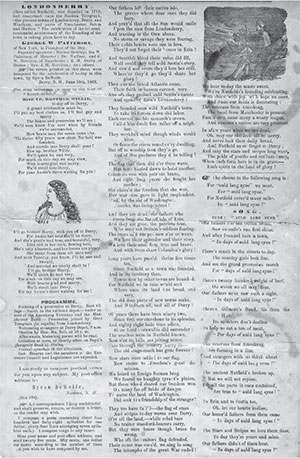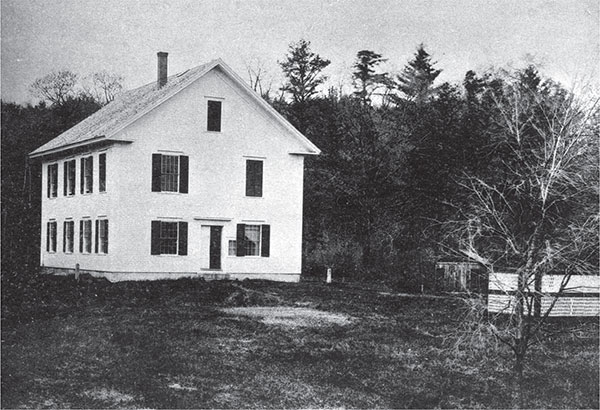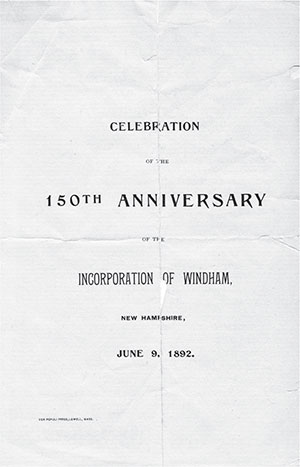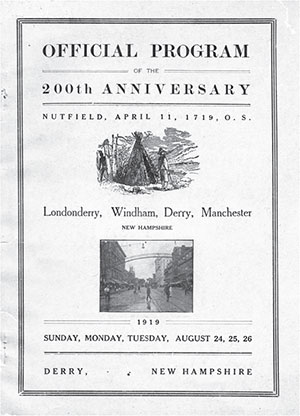
An 1869 broadside printed for the celebration of the 150th anniversary of the settlement of Nutfield. Author’s collection.
20
HOW WINDHAM HAS CELEBRATED ITS HISTORY
Throughout the history of America, towns and cities across the nation have had the occasion to celebrate their anniversaries. Such occasions give each generation of residents an opportunity to show pride in their town’s unique history. These celebrations help to preserve history by stirring up interest in the past, as well as getting residents directly involved in the town’s history. Windham has benefitted from several of these historic celebrations throughout its nearly three-hundred-year history. Anniversaries of Nutfield have also been an important part of the celebration of Windham, as Nutfield represents the earliest part of the town’s history.
NUTFIELD ’S 150 TH ANNIVERSARY : 1869
Windham as a town had no official part in the June 10, 1869 celebration of Nutfield’s 150th anniversary. In March 1868, the selectmen of Derry formed a committee to work with Londonderry for the purpose of celebrating the anniversary of Nutfield for the first time in its history. No significant progress was made toward planning the event until Londonderry appointed a committee to work on behalf of the town in November 1868. As parts of Manchester were originally a part of Nutfield, that city also formed a committee to work with the two other towns. However, Manchester did not take a significant part in the planning of the 1869 event.

An 1869 broadside printed for the celebration of the 150th anniversary of the settlement of Nutfield. Author’s collection.
The first meeting of the committees of Londonderry and Derry took place on December 9, 1868. At this meeting, a committee was formed with members of each town’s committees. This arrangement allowed the new committee to work on the major planning while each town’s individual committees could focus on the more detailed tasks at hand. George F. Adams of Derry was appointed as the group’s chairman. The other two appointed positions of secretary and treasurer were filled by Robert Mack and Jonathan McAllister, respectively; both men were from Londonderry. Although Windham as a town did not participate in the planning, two of Windham’s prominent citizens were chosen as members of the committee. Deacon Samuel Campbell and George Weston were the two men chosen to take part in the celebration.
At one of the subsequent meetings of the committee, the date of June 10 was selected for the celebration, despite the first settlers arriving in Nutfield on April 22. As the event needed to be easily accessible to the townspeople of all three towns, Derry Depot was chosen as the location. The particulars of the event were established over the next several months, including arrangements for notable speakers. As the day of the first celebration of Nutfield neared, the residents of Windham eagerly anticipated one of the first major celebrations of the town’s earliest settlement. Prior to 1869, there were only a few significant celebrations in town, including a major celebration of the Fourth of July about forty years prior.
When June 10 finally arrived, people came from Londonderry, Derry and Windham, as well as the surrounding localities, to take part in the once-in-a-lifetime event. Those residing near Derry Depot started their day with the ringing of the church bell and the ceremonial firing of a cannon. Shortly after 8:00 a.m., a procession formed in the Upper Village of Derry. The procession was led by Henry E. Eastman in the capacity of chief marshal. Eastman led the Amoskeag Veterans and the Manchester Cornet Band as they followed their short route around Derry. First making its way through the village, the group then continued on to the Adams Female Academy and then back to its starting point. From there, the procession continued on to the Lower Village of Derry, where a large tent had been erected for the occasion on “Doak’s Plains.” It was here that students from Pinkerton Academy joined the group, having been led there by a Mr. Hazen. Many of the pupils from Derry’s other schools were also marshalled to the plains by Hazen.
At 10:00 a.m., a train arrived from Boston, which had picked up many passengers from Londonderry, Windham and Salem along its way to Derry. Prominent citizens from Boston, Lowell and some of the surrounding locales also arrived at the Derry Depot by train. At this point, the crowds grew even larger, having been joined by the members of Londonderry’s Good Templar, who were dressed in their full regalia. At last, the entire crowd for the day had formed, and it would not be long before the day’s events began.
The first event of the day was an oration by Charles H. Bell, who later became the governor of New Hampshire, which took place at 11:00 a.m.
This was followed by the recitation of historical poems. One such poem was written by Byron DeWolfe of Nashua for the event. It recounts, in the form of a poem, the settlement of Nutfield, as well as historical events that had taken place since the founding. In only one stanza is there a mention of Windham:
Long years have passed, thrice five times ten,
Since Nutfield as a town was founded,
And in its territory then,
Towns now by other towns are bounded;
For Nutfield we in vain would seek,
Where once its land was broad and very,
The old does parts of new towns make,
And Windham all, and all of Derry!
At about noon, once all the poems had been read, the attendees reconvened as a group on Doak’s Plains, which was located to the east of Derry Depot. This gave the crowds an opportunity to attend to any urgent business or obtain much-needed refreshments. The remainder of the orations of the day were made following this short interlude.
George W. Patterson, the former lieutenant governor of New York, was chosen to preside over the event as president. Patterson was raised in Londonderry and attended Pinkerton Academy. Thus, his political prominence and Nutfield roots made him an excellent choice to give one of the day’s most anticipated addresses. Horace Greeley, the much-noted editor of the New York Tribune , also gave a speech that day. Other speakers at the event included E.H. Derby of Boston and Samuel H. Taylor of Phillips Academy in Andover. The end of the speeches signaled the end of the event, and the Windham residents in attendance returned home with many memories of the day. It was recorded by Leonard A. Morrison that the events of June 10 “would never be forgotten by those present.”
WINDHAM ’S 150 TH ANNIVERSARY : 1892
Prior to 1892, Windham had never celebrated the anniversary of its township. The need for such a celebration was recognized as Leonard Morrison began working on his history of Windham in the early 1880s. It was at that time that some of the descendants of the early settlers and founders of the town proposed that there be a celebration for the 150th anniversary. However, it was not until about 1891 that much of the detailed planning was completed for the event.
Although Windham was incorporated on February 23, the winter months would certainly not have been conducive for an outdoor celebration. June was chosen not for any particular significance but rather for its promise of many warm, summer days. Before the details of the event were planned, it was necessary to prepare a petition for the town selectmen to hold a special meeting for the purpose of planning an official day to observe the anniversary. The ease of obtaining the signatures of residents on the petition reflected the excitement throughout town for the impending celebration.
A committee was chosen to oversee the planning of the event at a town hall meeting on January 23, 1892. After it was unanimously voted that there would be a celebration of the anniversary, two members from each of the seven school districts were chosen to become members on the committee. The first task of the committee was to raise the funds for the June celebration. After just a couple weeks of brainstorming, the idea of holding a C-themed supper was chosen as the best option for fundraising. Only foods that began with the letter c were served at the supper, which took place in the town hall. Some of the foods included clam chowder, chicken pie, Chinese tea, cream pie and chocolate pudding.

The town hall as it would have appeared during the 1892 celebration. From History of Windham in New Hampshire (Rockingham County), 1719–1883.
Richard Carle, who later became a well-known film actor in the first half of the twentieth century, was hired to provide comedic entertainment for the night. Carle’s performance was included in the price of admission for the meal: forty cents for adults and twenty cents for children under the age of twelve. In order to supplement the income from ticket sales, ice cream and flowers were also sold at the supper.
There was an excellent turnout for the event, and $115 was raised between ticket sales and other purchases. As a foot and a half of snow had fallen by the morning of the twelfth, and the winds were particularly strong that day, the success of the event serves as a testament to the townspeople’s enthusiasm for the event and for the summer celebration it would pay for. The following day, an executive committee was formed for planning the celebration of the anniversary, and several subcommittees were established. Over the next month, one of the most important tasks of the executive committee was to select the proper place to hold the event. Abel Dow, owner of the Granite State Grove, offered the town use of the entire park, save the skating rink. However, the town declined, and the town center was chosen instead.

The cover of a program produced for the celebration of the 150th anniversary of the incorporation of Windham in 1892. Author’s collection .
After several more months of planning, the fateful day had finally arrived. The day commenced with the ringing of the bell at the Presbyterian Church at sunrise. Around 9:30 a.m. John H. Dinsmoor arrived with the Haverhill Band at Schoolhouse No. 6, where the pupils of that district joined the procession as it made its way to the town hall. When the procession reached the town hall, its members were greeted by the crowds who had been waiting in anticipation for the commencement of the events of the day. Reverend Blanchard of Andover, Massachusetts, opened the ceremony by reading from the scriptures, which was followed by a prayer led by Reverend Berry of Pelham, New Hampshire.
Following a short performance by the Windham Glee Club, Leonard Morrison took the stage and delivered his welcoming address. This was received well by the crowd, but many of the younger people in the crowd likely hoped for a rather terse speech, as it was to be followed by a more lively performance by the Haverhill Band. After a short but dynamic performance by the band, the crowd was treated to a reading of the original petition asking for a town charter, the document responsible for the incorporation of Windham as a town separate from Londonderry. It was as a result of this petition that the day’s celebration was taking place. The town clerk John Cochran was selected to read the petition.
Before another interlude of music by the band, Morrison recited a poem that was written by Margaret Dinsmoor especially for the event. The poem captured the story of the early Scotch-Irish settlers who first settled Nutfield. James Dinsmoor of Sterling, Illinois, followed the performance of the band, delivering the historical address. He was invited on behalf of the executive committee in order to give the address. Keeping with the theme of interjecting music between the readings and speeches, the Windham Glee Club performed again, this time performing the song “The Rock of Liberty.” The group received a roaring round of applause for its rendition.
When Morrison took the stage again to address the crowds, he realized that the time had passed much faster than he had originally planned. There would not be time for a letter mailed via ship from Londonderry, Ireland, which was written by Reverend Gilbert Alexander Kennedy to be read at Windham’s anniversary. Instead, there would be an intermission during which the day’s dinner would be held. Once Morrison departed from the stage, he joined 139 speakers and distinguished guests on the first floor of the town hall, where five long tables were set up. The schoolteachers, pupils and other town officials, which in total numbered about 100, ate their dinners across the street in the Bartley house.
The remainder of the crowd amounted to about 1,500 people, all of whom were served their dinners in a large tent that had been erected at the town center. After everyone was seated in the tent, waiters began to bustle about their respective sections, serving 1,500 packages of previously prepared food. Although the meal was not as elaborate as that being enjoyed by the distinguished guests, it still satisfied the many people in attendance. Each person was given meat, cake or bread and a banana, which Morrison noted as being separated from the rest of the food by a “Japanese napkin.” Coffee was served with the meal, having been brewed in Boston and then shipped in large tanks to Windham. The coffee, as well as cold water, was available to all the guests of the celebration.
Just before 3:00 p.m., the crowds gathered again, and Morrison took to the stage to give a short toast to the town before the next address was given. Those not wishing to remain at the event had the opportunity to leave by train for Lawrence and Boston at Windham Junction. Many in the crowd who remained at the celebration listened attentively to the several speeches that followed, mostly on subjects concerning Windham. William H. Anderson delivered a speech on the history of Nutfield. Between every three or four speeches, the band played, giving the audience a most welcome intermission from the orations.
Albert Pillsbury’s speech concluded the orations of the day, and this was followed by a rendition of “America” sung by the audience, with music provided by the band. After the audience had finished its joyous performance, Morrison delivered the closing address, and then the band played for the last time that day, signaling the end of the first celebration of Windham’s incorporation. Large wagons then arrived at the town center to bring those traveling home by train to Windham Junction. Those who resided in town returned home with the knowledge that months of hard work and planning had paid off.
NUTFIELD ’S 200 TH ANNIVERSARY : 1919
The 200th anniversary of Nutfield was the most momentous celebration that has taken place in the town’s almost three-hundred-year history. All three towns had grown significantly since the last anniversary in 1869, resulting in much larger crowds for the event. While the previous Nutfield celebration was limited to a single day, the 200th anniversary was celebrated over the course of three days, August 24, 25 and 26. The size of the event required over a dozen committees and hundreds of people to plan each part. The committees were responsible for the gamut of duties, including arranging transportation, creating the souvenir program and organizing the pageant. One of the committees was also tasked with identifying historic spots in what was Nutfield, which helped to generate greater interest in these sites throughout the community. Although the majority of the sites that were published by the committee were located in Derry, there were several in Windham, one of which was the site of the first settlement on Copp’s Hill near Cobbett’s Pond. The site of John Gregg’s death at the hands of Indians in 1721, as well as Indian Rock, was also included.
In the days leading up to the celebration, many local businesses took advantage of the excitement to use Nutfield for promotional purposes. Dudley’s Jewelry Store in Derry showcased a drum from 1720 that belonged to pioneering settler James Gregg; it had been exhibited for the 150th anniversary, as well. Also, a gun that was owned by Robert “Rustic Bard” Dinsmoor was on display in the window of the store. Both of these items of great historical significance were on loan to Dudley by H.P. Dinsmoor.
Although the event was primarily attended by residents of Londonderry, Derry and Windham, some individuals with ancestral connections to one of the Nutfield towns made trips of hundreds of miles to take part in the celebration. Reverend A.B. Cristy, whose ancestors lived in Windham, traveled approximately 650 miles from Panesville, Ohio, to spend the week of the Nutfield celebration in Derry. As the celebration was held in Derry, the only chance Cristy would have had to participate in an event in Windham would have been the Windham Women’s Club dance in honor of Nutfield on the previous Saturday.
The celebration began on August 24, a Sunday, at the historic First Church in East Derry. It was here that Alan B. Shepard, the father of the astronaut with the same name, played the organ music, which opened the exercises of the day. This was followed by readings from the scriptures, recitation of hymns and the Schubert Quartette’s singing several songs. Several of the other churches around Derry also held services that day, some of which honored the anniversary of Nutfield. Only ecclesiastical services were held that day; the other events were to take place on the following two days.
The festivities on Monday began at 8:00 a.m. with a parade of “antiques and horribles,” with prizes given in several categories. The top prize awarded was twenty-five dollars for the “most horrible band,” with the stipulation that in order to win the prize, the band had to be no fewer than nine pieces. Aside from the category for the most horrible parade float, the other prizes were awarded in several costume categories. A panel of five judges was organized to pick the winners in each category.

A 1919 official souvenir program produced for the 200th anniversary of Nutfield. Author’s collection .
At the conclusion of the parade, much of the crowd made its way to the baseball field where the Salem Cadet Band performed a concert prior to the baseball game. At 10:00 a.m. sharp, fans of baseball, young and old, remained at the field to watch the first game of that day’s doubleheader between two rivals, the Derry Athletic Association and McElwain of Manchester. Those who were not interested in baseball or did not have the patience to sit through every inning had the opportunity to watch a whippet race take place on Birch Street. For those not familiar with whippet racing, whippets are medium-sized dog breeds, often described as smaller greyhounds.
The baseball game ended just before noon, giving the spectators and players an opportunity to watch a once-in-a-lifetime stunt. “Daredevil Smith” of Newburyport, Massachusetts, ascended in a hot air balloon, from which he leapt with only a parachute after reaching the desired height. What a sight! Such a stunt would have been almost unheard of in southern New Hampshire. Unlike today, parachute technology was primitive, and only trained stuntmen undertook such endeavors.
This exhilarating event was followed by a parade that was led by mounted police from Derry. Following the officers were eight divisions of several different groups, the first of which was led by Alan B. Shepard. Each division included a band, as well as a variety of veterans and fraternal groups. The fire department, as well as many local businesses, also took part in the parade. H.P. Hood & Sons, was a featured part of the fourth division. Hood was the largest local dairy operation and obtained a portion of its milk from Windham farms.
At 3:00 p.m., the second baseball game of the day began, giving the team that lost the first game a chance to tie the day’s score with a win. While the fans were cheering on their hometown team, a bicycle race was held nearby, with prizes awarded for the first three finishers. The young man who finished first was awarded a loving cup worth $15.00, a prize that he could proudly display for years to come. Finishing in second place was worthy of a $2.50 gold piece, which could have been spent eagerly at the day’s festivities or saved for a rainy day. A much more practical prize was given to the third place finisher: a brand-new bicycle lamp for early morning and evening riding.
With America’s newfound love of all things flying since the Wright brothers’ first flight, it was fitting that there was an airplane demonstration at the celebration. George Watkins of the Downing Aerial Transportation Company flew an airplane over Derry to the delight of the crowds. This was followed a couple hours later by another hot air balloon ascension, but this time, there was no daredevil to jump out.
The day’s events ended with a pageant held on the grounds of Pinkerton Academy. The pageant was written to showcase the common history of Londonderry, Derry and Windham. This included a reenactment of the settlement of Nutfield until its incorporation as Londonderry. The pageant then continued on with various scenes from the French and Indian War, a typical colonial wedding, as well as the advent of modern industry. One thousand seats were made available for the pageant, which gives an idea of how popular the event was expected to be. There were likely some Windham residents who traveled to Derry to purchase their tickets at Warren’s News Store or Stockdale’s; each ticket was sold for one quarter. For the few in Windham who might have desired to drive by automobile to Pinkerton, they could enjoy the pageant with the assurance that their vehicles would be under police protection for the entirety of the event. For the rest, trains arrived and left Derry every ten minutes for an hour or so before and after the event.
With the busiest day of the Nutfield celebration over, there were only a few events scheduled for Tuesday, and none like the stunts and sporting events of the previous day. At 10:00 a.m., Reverend Jesse G. MacMurphy gave his historical address, which was then followed by other various addresses. When the speeches concluded a few hours later, a banquet was held in Adams Memorial Hall for the celebration’s presidents, as well as special guests and their wives. However, it was also possible for others to attend the banquet with the purchase of a $1.75 ticket.
Those who could not justify spending that much on a ticket or just had little interest in attending the banquet had the opportunity to witness a most unusual gathering. At 1:30 p.m., a reunion was held for those who had attended the previous Nutfield anniversary in 1869. As it had been fifty years earlier, it was unlikely that there were many members of the original group in attendance. When one thinks about all the changes and history that took place within that half century, it is astounding to imagine what those who were part of the reunion witnessed. It is unknown if any of the Windham residents who attended the 1869 reunion were part of the reunion.
Half an hour later, the final addresses of the celebration of the 200th anniversary of Nutfield began, lasting for a couple hours. When the last word of the last address was spoken, there was only one activity left for this historic event. A firework demonstration was set to take place at 8:30 p.m., and crowds gathered on the field of the Derry Athletic Association to watch the sky light up in various colors as the 200th anniversary of the settlement of Nutfield came to a conclusion, with the next major anniversary half a century away.